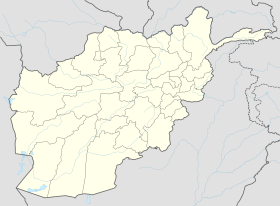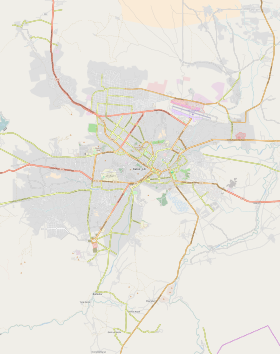On 31 May 2017, a truck bomb exploded at a crowded intersection in Kabul, Afghanistan, near the German embassy at about 08:25 local time (03:55 GMT) during rush hour,[3] killing over 150 and injuring 413,[4][5] mostly civilians, and damaging several buildings in the embassy.[6][7] The attack was the deadliest terror attack to take place in Kabul. The diplomatic quarter—in which the attack took place—is one of the most heavily fortified areas in the city, with three-meter-high (10 ft) blast walls, and access requiring passing through several checkpoints.[3][7] The explosion created a crater about 4.5 meters (15 ft) wide and 30 feet deep.[8] Afghanistan's intelligence agency NDS claimed that the blast was planned by the Haqqani Network.[9][10] Although no group has claimed responsibility, the Afghan Taliban were also a suspect but they denied involvement and condemned the attack.[11][12] It was the single largest attack on the city up till that point.[13]
| May 2017 Kabul attack | |
|---|---|
| Part of War in Afghanistan (2001–2021) | |
| Location | Wazir Akbar Khan, Kabul, Afghanistan[1] |
| Date | 31 May 2017 08:25 AM (UTC+04:30) |
Attack type | Truck bomb |
| Deaths | 150+[2] |
| Injured | 413+ |
Background
editKabul is held by the NATO-supported Afghan government, though both the Taliban and Islamic State were able to launch destructive attacks on the capital in the preceding months.
Referring to the wider conflict, in April the Taliban announced a new offensive, saying their main focus would be foreign forces.[14] The United States has been considering sending additional troops to Afghanistan to help stabilize the country.[7]
Attack
editA vacuum truck was filled with about 1,500 kilograms (3,300 lb) of explosives and then detonated near the German embassy.[15][16] The blast occurred at 08:25 local time, during rush hour, at one of the busiest areas of Kabul: near Zanbaq Square next to the German embassy.[17] At least 90 people were killed and 400 injured.[18] Afghan President Ashraf Ghani later updated this total, stating, "Over 150 entirely innocent Afghan sons and daughters were killed and more than three hundred were brought to hospital with burns, lacerations, and amputations."[19] The blast was said to have done damage four kilometers (2.5 mi) away. The blast created a crater over nine meters (30 ft) deep.[20] The majority of the victims were civilians.[18] Casualties included Mohammed Nazir a driver for BBC News, a staff member of Tolo News, and an Afghan security guard for the German embassy.[21] Afghan journalist Tajuden Soroush, present in the car with Mohammed Nazir, survived the event.[22]
Injuries were reported among the Japanese[23] and German diplomatic missions.[18] The Japanese, German and French embassies all sustained damage to their buildings.[8][18]
Responsibility
editNo group immediately claimed responsibility for the attack. Both the Taliban and Islamic State had claimed responsibility for earlier Kabul bombings in 2017, although the former issued a statement denying responsibility for the attack.[3][18] The National Directorate of Security (NDS) claimed that the blast was planned by the Afghan insurgent group Haqqani Network, and reiterated allegations that those elements had support and presence across the border in Pakistan.[10] Pakistan's Foreign Ministry spokesman, Nafees Zakaria, rejected the Afghan allegations as "baseless".[24]
Aftermath
edit- June anti-government protest
Anti-government protests broke out in response to the 31 May bombing, with protesters continuing their ongoing complaints about the lack of security provided by government forces in dealing with insurgents and terrorist attacks. They demanded removal of President Ashraf Ghani's government and pushed for formation of an interim administration, at least partly for its failure to stop the attacks. The protesters chanted anti-American and anti-Pakistani slogans, demanded execution of militant inmates and accused the government of being too lenient in the fight against the insurgents. During the 2 June protest, some demonstrators continued moving forward after requests by police to stop several hundred meters away from the presidential palace, witnesses said. Security forces opened fire and used water cannons and tear gas to disperse the crowd. At least five demonstrators died and another 15 were wounded; the son of deputy head of Senate Salim Ezadyar was one of those killed.[25][26]
- Funeral bombing
On 3 June, following the death of deputy head of Senate Salim Ezadyar's son at the Kabul anti-government protest the previous day, his funeral took place. This funeral proceeded as scheduled despite authorities warning that militants could target any gathering as they had done the year before. During the funeral, three consecutive explosions took place, killing at least 18 Afghans and wounding dozens more. No immediate claim of responsibility for the attack was made.
- Tent sit-ins
Starting on 2 June and continuing for several weeks, individuals and a variety of civil society groups started sit-ins in tents in central Kabul, protesting against the violence and calling for investigations and prosecutions of police responsible for the killings of protestors and for the dismissal of those with command responsibility. The new protest coalition took on the name Uprising for Change.[27][28]
See also
edit
References
edit- ^ Abed, Mujib Mashal, Fahim; Sukhanyar, Jawad (31 May 2017). "Deadly Bombing in Kabul Is One of the Afghan War's Worst Strikes". The New York Times.
{{cite news}}: CS1 maint: multiple names: authors list (link) - ^ "Kabul truck-bomb toll rises to more than 150 killed: Afghan president". Reuters. 6 June 2017.
- ^ a b c "Kabul bomb: Dozens killed in Afghan capital's diplomatic zone". BBC News. 31 May 2017. Archived from the original on 31 May 2017. Retrieved 31 May 2017.
- ^ Mashal, Mujib; Abed, Fahim (31 May 2017). "Huge Bombing in Kabul Is One of Afghan War's Worst". The New York Times. ISSN 0362-4331. Archived from the original on 31 May 2017. Retrieved 31 May 2017.
- ^ "Snapshot: Large-Scale Vehicle-Borne Improvised Explosive Device Testing". dhs.gov. 29 June 2017. Retrieved 19 September 2023.
- ^ "RS Claims Police Stopped Truck From Entering Green Zone". Tolonews. Archived from the original on 31 May 2017. Retrieved 31 May 2017.
- ^ a b c Popalzai, Ehsan; Smith-Spark, Laura; and Karimi, Faith (31 May 2017). "Afghanistan explosion: 80 killed in blast near diplomatic area". CNN. Archived from the original on 31 May 2017. Retrieved 31 May 2017.
- ^ a b "Explosion in diplomatic row of Kabul kills 90, wounds hundreds". CBC News. 31 May 2017. Retrieved 31 May 2017.
- ^ "Kabul bomb: Afghans blame Haqqani and Pakistan". Sky News.
- ^ a b Gul, Ayaz (31 May 2017). "Deadly Truck Bomb Rocks Kabul". VOA.
- ^ Rasmussen, Sune Engel (31 May 2017). "Kabul: at least 150 killed by massive car bomb in diplomatic quarter". The Guardian. Retrieved 31 May 2017.
- ^ "Kabul blast: Taliban denies involvement, condemns attack on civilians". Firstpost. 31 May 2017.
- ^ ""No Safe Place"". Human Rights Watch. 8 May 2018. Retrieved 19 September 2023.
- ^ "Afghan Taliban announce spring offensive". BBC News. 28 April 2017. Archived from the original on 30 May 2017. Retrieved 31 May 2017.
- ^ Rasmussen, Sune Engel (31 May 2017). "Kabul: at least 80 killed by massive car bomb in diplomatic quarter". The Guardian. Archived from the original on 31 May 2017. Retrieved 31 May 2017.
- ^ "Officials Say 1,500kgs Of Explosives Used In Kabul Truck Bomb". TOLOnews. 31 May 2017. Retrieved 19 September 2023.
- ^ Mashal, Mujib; Abed, Fahim (31 May 2017). "Kabul Bombing Kills at Least 80, Shaking City Center". The New York Times. ISSN 0362-4331. Archived from the original on 31 May 2017. Retrieved 31 May 2017.
- ^ a b c d e "Kabul bomb: Diplomatic zone attack kills dozens". BBC. 31 May 2017. Archived from the original on 31 May 2017. Retrieved 31 May 2017.
- ^ Held, Amy (6 June 2017). "Death Toll In Kabul Blast Surpasses 150, Afghan President Says". NPR.org. Retrieved 17 June 2017.
- ^ "At least 90 killed, 400 wounded after car bomb goes off in Kabul". The Hays Daily News. 1 June 2017. Archived from the original on 20 June 2017. Retrieved 1 June 2017.
- ^ "Afghanistan blast: BBC driver killed and four journalists injured after huge car bomb kills at least 80 in Kabul's diplomatic quarter". Telegraph. 1 June 2017.
- ^ "Kabul bomb: Afghan leader condemns 'cowardly' attack". BBC News. 31 May 2017. Archived from the original on 31 May 2017. Retrieved 11 September 2021.
- ^ "Kabul bomb: Diplomatic zone attack kills dozens". BBC News. 31 May 2017. Retrieved 19 September 2023.
- ^ "Afghanistan blames Pakistan and Taliban for Kabul blast". aljazeera.com.
- ^ "At least 18 Afghans killed as multiple blasts target funeral for protester in Kabul". washingtonpost.com.
- ^ "Amnesty International Calls For Probe Into Shooting Of Protestors". Tolonews. 2 June 2017.
- ^ "AAN Q&A: Tents and Bullets – the crackdown on the Kabul protests". Afghanistan Analysts. 23 June 2017. Archived from the original on 6 June 2021. Retrieved 6 June 2021.
- ^ Amiry, Sharif (3 July 2017). "Uprising for Change Movement Hold Peaceful Rally In Kabul". TOLOnews. Archived from the original on 6 June 2021. Retrieved 6 June 2021.

